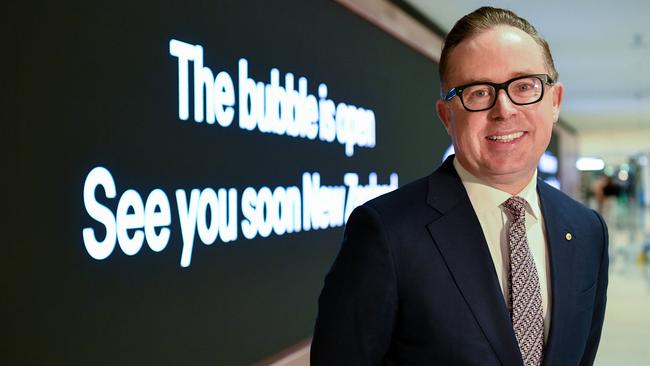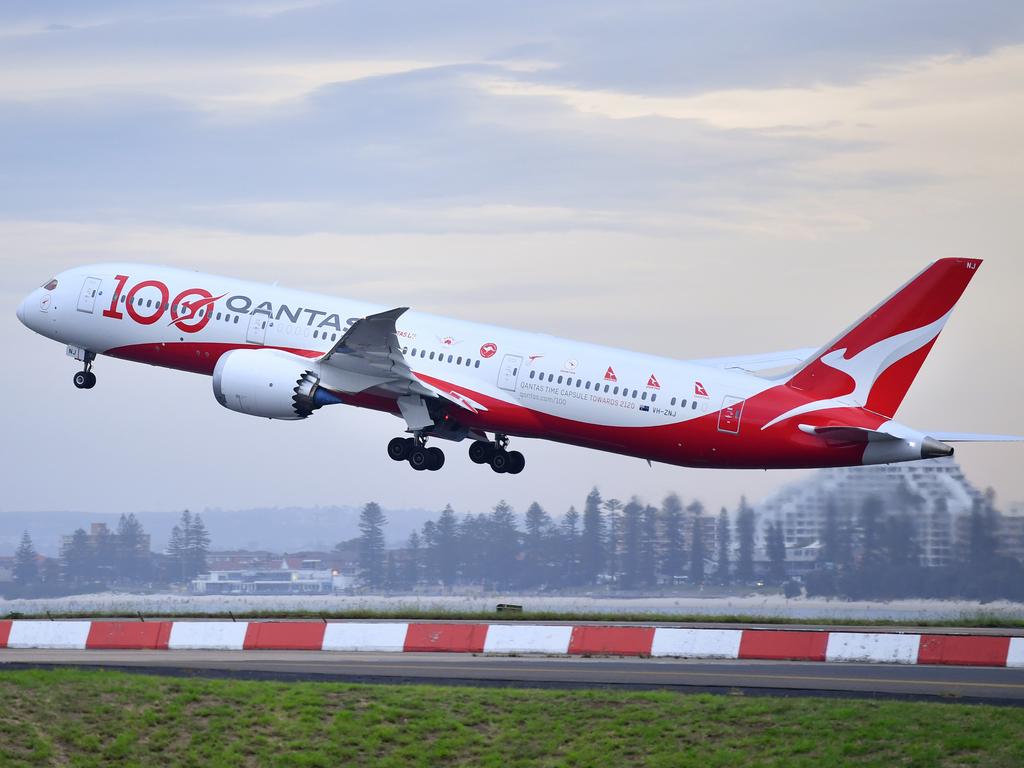Qantas announces job cuts, two-year wage freeze
Qantas claims no other Australian company has suffered more in the COVID pandemic, as it heads towards another $2bn annual loss.

Qantas will shed more workers and freeze the pay of remaining staff, as it heads towards a second consecutive annual loss in excess of $2bn.
In a sobering market update, Qantas CEO Alan Joyce said the airline had been hit harder than any other Australian company by the COVID-19 pandemic, losing $16bn of revenue since early last year.
As a result, a full year loss of more than $2bn was expected, taking the group’s total losses in 2020 and 2021 to $4.7bn.
“I think it’s safe to say there’s no other company in Australia that’s had a bigger impact from COVID than the Qantas Group, so we will clearly have a lot of repair work to do. But the business is showing all the signs of being able to achieve this,” said Mr Joyce.
Already the company had begun to pay down its debt which peaked at nearly $6.5bn in February.
Mr Joyce said the strong domestic travel market was generating cash but employees and management would still have to cop a two-year wage freeze, as part of new enterprise agreements.
“This isn’t a reflection of the hard work of our people but it is a reflection on the harsh reality we face,” he said.
Voluntary redundancies would be sought from international cabin crew, with several hundred expected to take up the offer.
Mr Joyce was hopeful no further jobs would have to go from the airline, which has already farewelled close to 8500 people.
Another 6000 remained stood down, while 16,000 had returned to work.
“Based on what we know now, this is the level of redundancies that are needed to get us through this crisis and we don’t see any more being required but you can never say never in this space,” said Mr Joyce.
He was insistent the vaccination rollout must gather pace so borders would not remain closed a day longer than needed.
But he was careful to stress that borders should only open when it was “safe to do so”, in contrast to the language used by Virgin Australia CEO Jayne Hrdlicka.
Speaking at a business lunch on Monday, Ms Hrdlicka suggested borders must reopen even if it meant some people may die.
“There’s been a lot of discussion about how and when borders should open,” said Mr Joyce. “We know from surveying our own customers they want it to be sooner rather than later. But everyone can agree: it has to be safe.”
Ms Hrdlicka said she could have chosen her words better, and she understood if some people had found them hurtful.
In an effort to move the conversation beyond the gaffe, Virgin Australia announced a dramatic ramp up in flights, with 700 extra services a week to be scheduled by October.
More aircraft and 250 additional staff would help deliver the flights which included new routes to the Whitsundays, Cairns, Townsville and the Gold and Sunshine Coasts.
Deputy Prime Minister Michael McCormack joined Ms Hrdlicka for the announcement in Brisbane, saying the increase in flights showed “faith in the economy”.
“I say well done Virgin, for having faith in the Australian people,” said Mr McCormack.
Mr Joyce was unmoved by the positive news from the rival carrier at the same time as Qantas was reducing staff and freezing wages.
He said Qantas was the BMW or Mercedes of air travel in Australia, and was watching from the sidelines as Virgin Australia and Rex battled it out for the middle ground.
“They have the same aircraft, the same product on board, they look exactly the same, they’re going aggressively against each other on the routes they are on and they’re both going for the same middle of the road strategy,” said Mr Joyce.
“Qantas is out of that. (Qantas) is the BMW, it’s the Mercedes of air travel in Australia and then we’ve got the price sensitive end of the market (with Jetstar). We’re very comfortable we’re in a competitive position.”
Unions flagged their disappointment with the two-year wage freeze, accusing management of “acting like a dictator”.
Flight Attendants Association of Australia national secretary Teri O’Toole said the wage freeze made a mockery of negotiations for new enterprise agreements.
“What’s there to negotiate when we’re told all employees will get no pay rise for two years, and then only 2 per cent,” Ms O’Toole said.
“Why not just rollover existing EBAs then go through the farce of negotiating?”
Transport Workers Union secretary Michael Kaine questioned why the federal government kept providing financial assistance to Qantas when the airline kept cutting jobs.
“This year Qantas will have received $2 billion in federal government funding. On top of that the airline has wrung more public funding from state governments following recent announcements,” said Mr Kaine.
“We cannot see the benefit of this funding for the public when it continually results in job losses, outsourced workers and lower wages.”
Financial analysts welcomed the Qantas announcement however, and investors responded, with the company’s share price closing up 16 cents for the day at $4.68, the highest in over a week.
“Qantas’ announcement included a number of credit-positive updates,” said Moody’s Investors Service vice president Ian Chitterer.
“These include the start of balance sheet repair as net debt starts to reduce, the expectation that the group will be free cash flow positive for the second half of fiscal 2021, and ongoing strong liquidity.
“We expect Qantas to emerge from the pandemic in a strong position and with an increased domestic market share and lower cost base.”






To join the conversation, please log in. Don't have an account? Register
Join the conversation, you are commenting as Logout